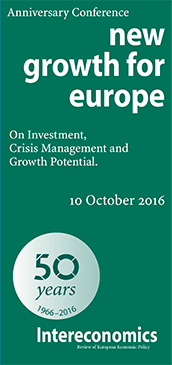INTERECONOMICS – REVIEW OF EUROPEAN ECONOMIC POLICY
|
|
The July/August 2016 issue of Intereconomics focuses on the threats and opportunities facing Europe both in the present and in the coming years. Naturally, the spectre of Brexit hangs over proceedings, as the result of the referendum on June 23rd has sent shockwaves throughout the continent. Both our editorial and Letter from America address the issue, and the topic is referenced throughout the issue. Meanwhile, our Forum highlights the efforts towards a socio-ecological transition, where welfare goals are pursued hand-in-hand with environmental considerations. The current issue also includes new research on the refugee crisis, the Greek sovereign debt crisis, as well as a critical review of the European Central Banks quantitative easing programme.
We are also proud to announce our 50th anniversary conference, titled “New Growth for Europe – On Investment, Crisis Management and Growth Potential”. We invite you to join us on 10 October 2016 at the German Federal Ministry for Economic Affairs and Energy in Berlin. Presenters include Tito Boeri, Daniel Gros, Karl Whelan, Clemens Fuest, László Andor and many other top European economists. Please follow us on Twitter at @intereconomics_ for updates, events and interesting economic findings. |
50th Anniversary Conference
New Growth for Europe
Featured Topic
Europe's Path Towards the Socio-Ecological Transition
Beset by an unprecedented combination of challenges including globalisation, demographic shifts, high unemployment and climate change, Europe is in dire need of a new kind of growth and development strategy. The authors of this issue's Forum make compelling arguments for a socio-ecological transition. This will require the decoupling of non-renewable energy use from GDP growth, the reduction of income and wealth inequalities, and the encouragement of innovation that is not based on fossil fuel technology. Despite these challenges, the Forum presents an optimistic path forward for the continent and offers practical policy solutions.
Additional Highlights from the Current Issue
What May Not Happen in UKexit
New UK Prime Minister May’s dictum that "Brexit means Brexit" is meaningless, because Britain is not a state, let alone a member state of the EU. Brendan O'Leary argues in his "Letter from America" that the term "Brexit" does verbal violence to the double union of the UK, and that one of May's problems is that she cannot exit one union, the European, without damaging the two other unions that make up the UK. One creative compromise: England and Wales could leave the EU, while Scotland and Northern Ireland remain within both the EU and the UK.
On the Distribution of Refugees in the EU
In order to optimally distribute incoming refugees among all EU countries, Martin Altemeyer-Bartscher et al. have developed a distribution key that reflects differences in the costs of integration in the individual countries. In order to reach a political agreement, the key for distributing refugees should be complemented by compensation payments that distribute the costs of integration among countries. While the EU Commission’s proposed distribution key takes account of appropriate factors, it is unclear in terms of detail.
The Political Economy of Brexit: Why Making It Easier to Leave the Club Could Improve the EU
The UK exit from the EU represents a qualitative change in the nature of EU membership. Annette Bongardt and Francisco Torres recommend that countries with preferences that are too divergent for the Union to function properly should not be discouraged from invoking Article 50. With the eurozone having established itself as the de facto core of European (political) integration, the UK's preference for a stand-alone (and incomplete) economic union became untenable.
Quote of the Month
|
|
|
|
from Annette Bongardt and Francisco Torres's article The Political Economy of Brexit: Why Making It Easier to Leave the Club Could Improve the EU
About Intereconomics – Review of European Economic Policy
Intereconomics is jointly produced by ZBW – Leibniz Information Centre for Economics and the Centre for European Policy Studies (CEPS). The journal appears bimonthly and features papers by economists that deal with economic and social policy issues and trends in Europe or affecting Europe. To submit a paper for publication, please visit the Submissions section of our website for relevant information.
Intereconomics is published by Springer-Verlag Berlin Heidelberg.
Newsletter Subscription
To unsubscribe from the newsletter, please visit the following web page, enter your email address, and click "unsubscribe": http://archive.intereconomics.eu/newsletter.php.
To change your email address, please unsubscribe as explained above and then resubscribe using your new address.
Editorial Office
Intereconomics
ZBW – Leibniz Information Centre for Economics
Neuer Jungfernstieg 21
20354 Hamburg, Germany
Phone: +49 (0)40 42834-306/307
Fax: +49 (0)40 42834-262
intereconomics@zbw.eu
and
Centre for European Policy Studies (CEPS)
Place du Congrès 1
1000 Brussels, Belgium
Phone: +32 (0)2 229 39 11
Fax: +32 (0)2 219 41 51
intereconomics@ceps.eu


